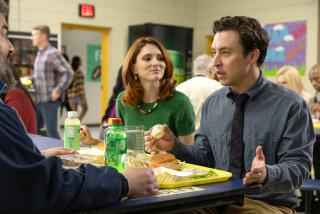Platform / Teachers: ‘They Saw Things in Me I Never Saw Myself ‘
- Share via
DOROTHY THOMPSON
Case Manager, Triangle Christian Service, and secretary to the Rev. Frank Higgins, True Way Baptist Church, Los Angeles.
I think all the time, every day even, about two teachers.
When I was going to school, there was still segregation. Being black, I thought: “If I can’t even eat where I want, why should I get an education? They’re not going to let me do anything, anyway.”
But these two women teachers, one in the fifth grade in Chickasha, Okla., and one in the 12th grade in Phoenix, Ariz., would tell me the same thing: “You must get an education. An education is the only way you can make it. The time will come you’ll need a diploma just to get a job mopping the floor.” Well, when you’re young, you aren’t thinking about an education. You’re thinking about playing. Those teachers would tell me I could do things in life. They saw things in me I never saw in myself. They kept pushing me. And when the door opened, I was able to step through.
ARLENE HAYASHI
Attorney in East Los Angeles
Two teachers had a huge impact on me. The first was Mr. Straubb. When I started his third-grade class at Bridge Elementary in East L.A., I couldn’t read and I didn’t even know the alphabet. Also, I was one of only three kids in the school who weren’t Latino. The other two were my brother and sister. Besides these things, my parents had separated and my mother was working two jobs. I was extremely depressed.
Mr. Straubb took a special interest in me--gave me access to the library and special tutoring. After school he’d let me stay in his classroom and read books while he graded papers. He was an alternative father figure to me.
The second teacher was Italian, a former newsman. He taught fifth grade and would tell us, “Your history books are all full of lies!” And he told me I had to go to college. I had never even thought of going to college until then.
CONNIE SCOLES
House cleaner, Glendale
When I was in the eighth grade I had many problems at home. A lot of emotional and physical abuse, so I was absent a lot. I tried to make up work I missed. But my English teacher was very cold-hearted. We had a big pizza party one day in her class, and each person was supposed to eat pizza with a partner. But I had no one to eat with. Usually a teacher would try to find someone for you or maybe put you in a group of three. But this teacher sat and ate with one of the other girls. I sat by myself, reading, trying not to let them see I was crying.
In the ninth grade, though, I had a sewing teacher who was very protective of me. She’d say something to the kids or take them aside when they teased me. She had a lot of kids in that class but somehow managed to get around to everyone.
JAIME REGALADO
Associate Professor of Political Science, Cal State L.A., and executive director of the Edmund G. (Pat) Brown Institute of Public Affairs.
I don’t remember any really special teachers until I got to my freshman year here at Cal State L.A. in 1969.
I grew up in Boyle Heights, Eagle Rock, Lincoln Heights and El Sereno. I had a regular public school education, very closed. But at college two teachers latched onto me and opened huge horizons I never knew existed.
Those teachers are Donald Bray and Edward Malecki, who today are my colleagues at Cal State L.A. They opened bodies of literature and knowledge more diverse, both ethnically and politically, than I had ever dreamed of. The exploration that resulted has stayed with me through the ensuing years. After I became a teacher myself I tried to show students that the world is not as closed as they may think, either racially or politically.
More to Read
Sign up for Essential California
The most important California stories and recommendations in your inbox every morning.
You may occasionally receive promotional content from the Los Angeles Times.










